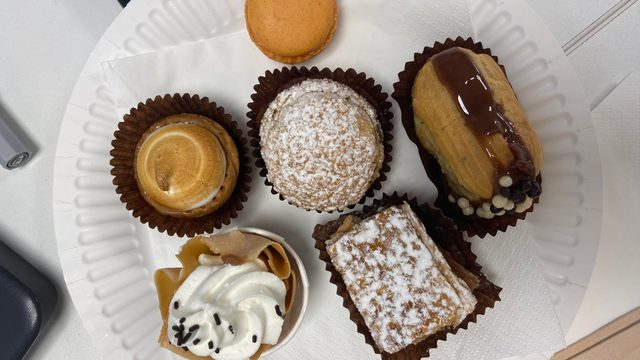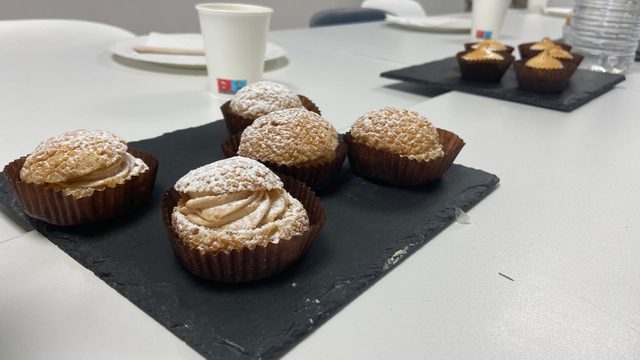Postcards from Montpellier 6 : Pastry Culture: A French Patisserie Experience at ILA
Want to find out more about French pâtisserie, what a Paris-Brest actually is, and how I ended up in a tasting workshop while interning in Montpellier? This week at ILA has been one of the sweetest yet - quite literally!

Hi everyone and welcome back to Postcards from Montpellier! My name is Tallie, I’m a modern languages student, currently on my year abroad.
For the first half of my year abroad I have been interning in Montpellier at Institut Linguistique Adenet, one of Wiseward’s partner schools, and I have learnt so much! From carrying out administrative tasks in French to learning office lingo, it has certainly been a journey! As I promised when I first started this blog, I plan to keep you up to date with all things year abroad and my life as an intern in Montpellier.
One of the things I was most excited for when moving to France was of course the cuisine! I have to admit that part of my love for learning languages comes from my passion of travelling, immersing myself in new cultures, in particular, trying new food!
So, when I was asked to observe and take part in a patisserie workshop this week, I simply couldn’t say no! This workshop is part of the extracurricular activities which are on offer at Insitut Linguistiaue Adenet.
If you are interested in boosting your French, French courses are available to book through the Wiseward website.
We also offer a wide range of cultural activities which allow students to put their French to practice outside of the classroom, ranging from trips to the famous old medieval city of Carcassonne, to wine, cheese and patisserie tastings- the latter are very popular among our students and they hurry to reception to book their places fast. I was excited to have the opportunity to take part in one myself!
Preparing for the workshop:
On a Thursday afternoon, along with preparing the new arrivals for the following week, the reception team gets everything prepared for the tasting workshops. We order in the pastries from a great local patisserie called Les Bo Gâteaux which isn’t far from the school’s buildings.
I got to work preparing the classrooms with plates, serviettes and 6 different pastries for each student to try. My mouth was watering at just the sight of it! Who would’ve thought a classroom could become a patisserie paradise?

This week has been a busy week as we have welcomed around 50 students who are enrolled in our French + Discover Mediterranean France for Seniors course. This course is designed for learners over 50, with at least A2-level French, who want to improve their language skills while exploring the rich heritage of Montpellier and the Occitanie region. The Patisserie workshop was prebooked as part of their package so when I joined the group I was indeed a little younger than my classmates but nevertheless, they were all incredibly welcoming to me!
The workshop lasted an hour and a half and I left not only feeling full but with a lot more knowledge about French patisserie! – Bravo to the excellent ILA teacher who ran the workshop! Here are some things I picked up from the workshop:
How to order correctly when entering a boulangerie (bakery) in France:
From my experience, the boulangerie is usually quite busy, however the queue moves quite fast so you have to be prepared when you get to the counter! The idea of ordering in French in a busy place can be quite stressful, bit I have found that the people behind the counter in Montpellier are so welcoming and encouraging. I think they genuinely appreciate it when non-French speakers make an effort to speak their language.
The first thing to know when you are ordering a pastry, is that for each item you can order it for one person ‘individuel’, or a full size portion to share with friends and family. The ‘individuels’ are like miniature versions of the fully sized ones- they’re so cute! I also found out the other day that you can actually order half a baguette (a demi baguette) instead of a whole one. This was a revelation for me as I love a baguette but had been avoiding buying it because I couldn’t manage to finish a whole one by myself- and baguettes go stale rather quickly!
Of course, one of the most important things to remember is to vouvoyer the people serving you in the boulangerie. This means always remembering to use the ‘Vous’ form when addressing someone you don’t know as a form of politeness.
Pain au Chocolat vs Chocolatine – The Pastry That Divides a Nation
Did you know that a pastry which we know and love has caused great linguistic rivalry across France?
This debate was alien to me until recently but having done some research it seems that French people get quite passionate about the name for their chocolate style croissant.

Apparently, this pastry is called a ‘Pan au Chocolat’ in most of France- especially in the North, the East and in Paris. However, in Toulouse, Bordeaux and even Montpellier, the locals refer to it as a ‘Chocolatine’.
Although this is just a friendly debate, there have been a number of petitions to make ‘Chocolatine’ formally recognised- it has even been discussed in the French National Assembly!
If you find yourself in France then Pan au Chocolat is the more commonly used term. However, if you are in Toulouse or Bordeaux the locals will love you for saying Chocolatine!
What is a Paris-Brest?
Before the Atelier at ILA, I hadn’t heard of the Paris Brest pastry. For those of you who relate, a Paris Brest is a decadent French dessert made of Choux pastry (think profiterole!) with a praline flavoured cream top with powdered sugar or almonds- délicieux!

Our teacher told us that the origin of the Paris Brest comes from the renowned bike race in France from Paris to Brest (a town in Brittany, situated on the most western tip of France) and back to Paris.
This race first originated in 1891, but it wasn’t until the year 1910 that a pâtissier named Louis Durand created the pastry to commemorate the race. The pastry is shaped like a wheel which is a tribute to the tyre of a bike. It is said that the Paris Brest also became a popular pastry for bikers, because the high calories allow for a perfect energy boost!
If you haven’t tried a Paris Brest before then I recommend ordering and trying one. An excellent chance to practice your French at the same time!
The real origin of macarons
Although the macaron is known as a French patisserie delicacy around the world, I learnt that actually, macarons come from Italy! The origin of the Italian macaron dates back to the Middle Ages, and these macarons were much more simple- without any colour or jam filling.
The reason why the macarons arrived in France is because of the marriage of an Italian noblewoman to Henry II of France. The almond flavoured sugared biscuit grew in popularity in France over the years, but it wasn’t until the 20th century that the double shelled, jam-filled macaron, which we are most familiar with, was introduced!
I’m sure you are all familiar with the macarons of today, it seems that in 2025 there are even more flavours than ever. I actually tried a mojito flavoured macaron the other day!

My thoughts and reflections
After taking part in the patisserie workshop, I can confirm that I’ve found a new favourite pastry- the Paris-Brest! I actually hadn’t heard of this pastry before the workshop but now I seem to see them everywhere… I think the main thing to take away from this experience is that ILA gives students a unique and quintessentially French experience. Language learning is more than just completing grammar exercises, it is about digging your teeth (literally!) into the culture and trying new things!
The patisserie workshop was certainly a unique experience, and I even have some new vocabulary to take away with me! It’s these sorts of experiences which make Institut Linguistique Adenet stand out as a language school- after all, it’s not every day you get to study patisserie at school!
Whether you are inspired to learn or boost your French or are searching for a new adventure, Wiseward is a brilliant place to start. Why not take a look at the website to see wide range of French courses (suitable for all levels) ILA has to offer?
ILA’s French and Cooking Course
If you, like me, have a passion for French Gastronomy then the French and Cooking course would be an excellent choice! The course consists of morning French lessons from Monday to Friday, and 2 evening cooking lessons with Les Ateliers Arthur. Not only will you get to develop your French skills, but you’ll also come away with some classic French recipes to try at home! This course, like many of ILA’s other courses, is catered to all levels of French, so even if you are at A1 level (beginner), this course would still be perfect.
I hope you are not feeling too hungry after all that food talk… I’m off to find a Pan au Chocolat… or should I say Chocolatine…!
See you next time for more Postcards from Montpellier!
À bientôt,
Tallie💌